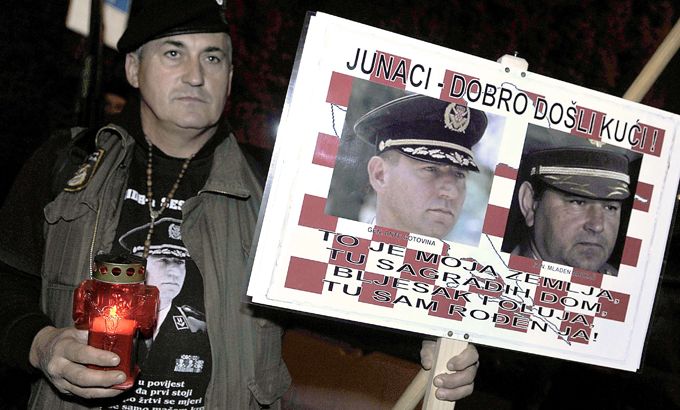Croatian generals return home after acquittal
Appeals judges at war crimes tribunal reverse 2011 rulings for crimes committed against Serb civilians in 1995.

Two Croatian generals have returned home to a hero’s welcome after a UN court in The Hague cleared them of war crimes against Serbs during the bloody 1990s breakup of Yugoslavia.
The dramatic acquittal of Ante Gotovina and Mladen Markac on Friday by the International Criminal Tribunal for the former Yugoslavia (ICTY) was met with tears of joy in Croatia and outrage in bitter foe Serbia.
Within hours, they were being cheered by tens of thousands of people waving Croatian flags and singing nationalist songs in Zagreb’s main square.
“We are happy to be with you tonight, this is our joint victory. The war belongs to history, let’s turn to the future all together,” Gotovina told the crowd after flying back from the Netherlands.
Earlier, cheers and applause erupted in a packed public gallery at the UN court as judge Theodor Meron acquitted the men.
But Serbia, which still has military and political leaders including Radovan Karadzic and Ratko Mladic on trial at the court, was furious at the acquittal and said it would scale back its co-operation with The Hague in protest.
Serbian President Tomislav Nikolic slammed the ruling as a “scandalous, political decision”.
“Today’s decision of the The Hague tribunal will not contribute to stabilising the situation in the region, it will open old wounds,” he said.
‘No joint criminal enterprise’
Gotovina and Markac were last year jailed for 24 and 18 years respectively for the murder of Croatian Serbs during their country’s struggle for independence and the bloody, ethnically driven Yugoslavia war.
But the court rejected the premise on which the initial convictions had been based, namely that any artillery that landed on Serb-inhabited towns and was more than 200 metres from a military target amounted to an attack on civilians.
Judges therefore also overturned the finding of “a joint criminal enterprise whose purpose was the permanent and forcible removal of Serb civilians from the Krajina region”.
Croatian President Ivo Josipovic said the acquittal was a vindication for Croatia.
“The verdict confirms everything that we believe in Croatia: that generals Gotovina and Markac are innocent and that there was no joint criminal enterprise of the Croatian leadership and the armed forces aimed at persecuting civilians, our citizens of Serb nationality,” he said.
Croatia is due to join the European Union in July having fulfilled the condition of handing over all war crimes suspects to the Hague-based court.
In Serbia, the acquittal was slammed by politicians across the board, human rights activists and ordinary Serbs. Many there suggested the decision was politically motivated to allow Croatia to enter the EU with a clean slate.
“Now Zagreb can join the European family with clean hands: no bloodstained past, forgotten are the expulsion of its Serb citizens,” Serbian human rights lawyer Radovan Radisic said.
Gotovina, and Markac, both 57, were convicted last year on nine counts including murder and inhumane acts committed against Serbs.
A former French Foreign Legionnaire, Gotovina was sentenced for war crimes that his troops committed during “Operation Storm” which he led in 1995, specifically the shelling of four towns in Croatia’s self-proclaimed Serb area
of Krajina in August of that year.
The lightning offensive led to the recapture of the Krajina region, crushing one of the last pockets of Serb nationalist resistance in an area where the community had roots going back centuries.
The prosecution said 324 Serb civilians and soldiers were killed and “close to 90,000 Serbs were forcibly displaced with the clear intention that they never return.”
The UN refugee agency put the number of people who fled the offensive at 250,000 while other UN estimates say about 600 people were killed.
Gotovina, the highest-ranking Croatian army officer tried by the court, and Markac appealed their sentences in May, arguing that Croatian artillery never targeted civilians.